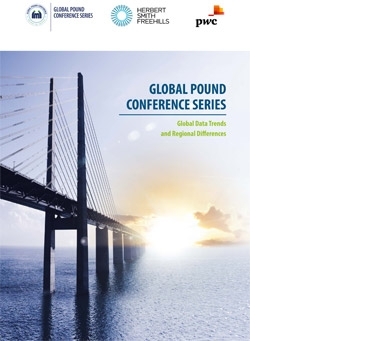The Global Pound Conference series – a unique and ambitious initiative to inform how civil and commercial disputes are resolved in the 21st century – brought together over 4000 dispute resolution stakeholders, at 28 conferences spanning 24 countries worldwide.
Herbert Smith Freehills, global founding sponsor of the series, has teamed up with PwC and IMI (International Mediation Institute) to identify key insights that emerge from the extensive voting data collected during the series. With a focus on the needs of corporate users of dispute resolution, this ground-breaking report challenges the traditional and fundamental notions of what clients want and how lawyers should represent them in a dispute. We identify four key global themes along with four notable regional differences.
Global themes emerging from the voting data reveal:
- Efficiency is the key priority of parties when choosing dispute resolution processes. Most dispute resolution continues to have as its frame of reference an adversarial process (litigation or arbitration) based on asserted legal rights. Yet two thirds of in-house counsel canvassed at GPC events said they require more efficiency in dispute resolution. This questions whether traditional dispute resolution processes still meet the needs of end users.
- Parties expect greater collaboration from advisors in dispute resolution. Around two thirds of in-house counsel said they need to see more collaboration from their lawyers. This applies when lawyers are interacting with both clients and opponents. This questions traditional notions of how lawyers should represent clients. Is the zealous advocate, fighting their client’s corner tenaciously at all costs, still appropriate?
- Global interest in the use of pre-dispute protocols and mixed-mode dispute resolution. With the data pointing towards a more collaborative and efficient approach, unsurprisingly delegates felt that disputing parties should be encouraged to consider processes like mediation before they commence formal proceedings. The data also showed a growing desire by parties to use mediation in parallel with litigation and arbitration.
- Some uncomfortable home truths for lawyers. In-house counsel were judged to be change enablers. As such, they shoulder a significant responsibility to encourage their organisations (and, if necessary, their external lawyers) to consider dispute resolution options more carefully, including using processes like mediation. In contrast, 70% of global delegates said external lawyers were the primary obstacles to change in commercial dispute resolution.
These insights show the potential of the GPC series to inform further studies and discussions across the world. Download your copy of our report here to learn more.
To discuss the content of this report and its impact on your organisation’s approach to dispute resolution, please contact the authors.
Key contacts

Simon Chapman KC
Partner, Regional Head of Practice - Dispute Resolution, Asia, Global Co-Head of International Arbitration, Hong Kong

Andrew Cannon
Partner, Global Co-Head of International Arbitration and of Public International Law, London

Christian Leathley
Partner, Co-Head of the Latin America Group, Co-Head of the Public International Law Group, US Head of International Arbitration, London
Disclaimer
The articles published on this website, current at the dates of publication set out above, are for reference purposes only. They do not constitute legal advice and should not be relied upon as such. Specific legal advice about your specific circumstances should always be sought separately before taking any action.




